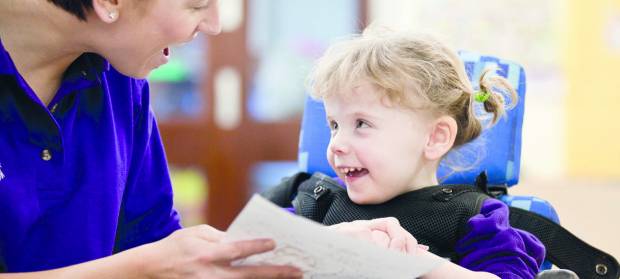And I am still learning, as attitudes towards her change as she gets older.
But regardless of this, the one thing I am committed to as she gets older is staying in sight. It is easy to respond to negative, even hostile, comments by staying indoors, where it’s safe, where it’s predictable and where you are not a spectacle. Sometimes that’s the worst bit. Going about what seems like a perfectly normal day only to run into an altercation because your normal doesn’t look much like anyone else’s anymore.
A real challenge, early on, was that there is nothing visibly different between Ellie and other children her age. Before we graduated to the special needs buggy somewhere between the ages of 3 and 4 we had a period where I wondered why the world seemed to have gotten a lot ruder. I was constantly getting doors closing in my face while out and about with Ellie, now a fairly big toddler but still in her buggy. The held doors and encouraging smiles of the baby phase had given way to people rushing to get through a door ahead of us and adapting their timing so we’d catch it in the face on the backswing. Lots of people frowned at us all the time. in an online discussion forum I read of mothers silently judging those who weren’t putting the legwork into making their off-spring walk age appropriately. Posters noted that “of course if special needs were involved then they wouldn’t judge. ..but in other cases the judgey-pants were justified”. The idea that they might not actually be able to tell which children have a disability did not seem to register much.
As Ellie gets older her
learning disability
 A learning disability is to do with the way someone's brain works. It makes it harder for someone to learn, understand or do things.
is getting more visible. This has been useful at times. The world became a nicer, friendlier place the day we got out Maclaren Major. The smiles came back and doors opened again. But new challenges emerge as we become more and more different. But I had a sobering evening at a parent’s speech therapy course a few years ago when I realised that we were the only family attending who still took their child out to mainstream public places. The others were too embarrassed by their children’s behaviour and too intimidated by public disapproval to go out.
A learning disability is to do with the way someone's brain works. It makes it harder for someone to learn, understand or do things.
is getting more visible. This has been useful at times. The world became a nicer, friendlier place the day we got out Maclaren Major. The smiles came back and doors opened again. But new challenges emerge as we become more and more different. But I had a sobering evening at a parent’s speech therapy course a few years ago when I realised that we were the only family attending who still took their child out to mainstream public places. The others were too embarrassed by their children’s behaviour and too intimidated by public disapproval to go out.
But it is hard. We buy-in a lot of childcare and when I find someone I suspect we’ll be using a lot I give them what I am starting to think of as “the speech”. I tell them that my daughter is a person and that, as a person, she has
rights
 Rights are the things everyone should be allowed to do like have a say, or go to school.
. Whatever is going on they need to remember she has a right to be here, in public, doing her thing - just like everyone else is. Is she hurting anyone? If the answer to that is ‘no’ then, most likely, you have to put some steel in your spine stand up straight and occupy that space alongside my daughter. They all look a bit bemused. But usually within about 6 months they will come to me and say: ‘Today it happened. Today I got challenged’. Often they are angry with themselves for not having a ready retort, but each one of them, so far, has stood their ground and that’s all I want. Not to give in to the pressure to disappear just because we cannot conform to the usual standards.
Rights are the things everyone should be allowed to do like have a say, or go to school.
. Whatever is going on they need to remember she has a right to be here, in public, doing her thing - just like everyone else is. Is she hurting anyone? If the answer to that is ‘no’ then, most likely, you have to put some steel in your spine stand up straight and occupy that space alongside my daughter. They all look a bit bemused. But usually within about 6 months they will come to me and say: ‘Today it happened. Today I got challenged’. Often they are angry with themselves for not having a ready retort, but each one of them, so far, has stood their ground and that’s all I want. Not to give in to the pressure to disappear just because we cannot conform to the usual standards.
I think of it now as a chance to practice courage, but sometimes it becomes more than that. Sometimes it is a chance to show joy. Many people, often well-intentioned, think of a severely autistic and learning disabled person as lonely and struggling. They think of us, as Ellie’s parents, battling away with tremendous challenges and trapped in interminable grieving. And sometimes we are sad and often we do struggle. But I genuinely think much of that is due to the failures of the systems supposed to be supporting us rather than Ellie’s disability. Being with Ellie is often the best fun I can think of. Here is a child who is as excited riding a bus as her peers would be at Alton Towers. Often I’m hunkered down at Ellie’s eye level, protecting myself from disapproving glances and my own residual embarrassment as I provide her with a running commentary o:f “Bus - Gooooo! Exciting! Exciting!” Ellie shrieks and giggles. We are noisy. But every now and then it happens: I glance up and notice with a slight lump in my throat that the lower deck of the bus is starting to laugh with Ellie, rather than at us. Maybe we’ve finally stayed in sight long enough for people to get used to us.
